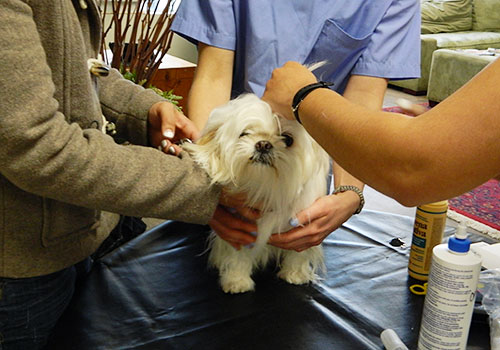
Companion animals enrich the lives of their owners in many ways, but veterinary care can be expensive. For low income families, the costs can be beyond their budgets.
That’s why in 2003 Ontario Veterinary School (OVC) graduate Michelle Lem started the Community Veterinary Outreach charity in Ottawa, which provides preventive veterinary education and care to the animals of the homeless and street-involved. Prof. Shane Bateman, Department of Clinical Studies, shares the role of regional veterinary director for the organization’s Golden Triangle region with OVC graduate Lea Nogueira-Borden (DVM ’02). They have been running clinics in Kitchener-Waterloo and Hamilton for the past four years. Earlier this spring, Bateman, Nogueira-Borden and a group of volunteers — mostly OVC students — conducted a pilot clinic in downtown Guelph.
The group worked with a coalition of social service groups to identify people who were homeless, marginally housed or making regular use of shelters, and whose animals had received no regular veterinary care for at least a year. Those identified were invited to bring their pets to the clinic where the animals were examined, vaccinated, microchipped, treated for parasites and checked for minor medical issues. If needed, the owners were referred to low-cost services to have the animals spayed or neutered. The owners also received food coupons for their pets. The organization also partnered with Wellington-Dufferin-Guelph (WDG) Public Health to provide human health care services to the pet owners as part of a ONE-Health initiative.
“A lot of what we are doing is client education, so this is a great opportunity to improve our communication skills,” said OVC student Tyler Hodgson, who volunteered at the clinic. “It feels good to be able to offer these services for free because so often finances get in the way of animal care.”
What impressed his classmate, Katie Gallagher, a student ambassador for the organization, was the love owners have for their pets, and how they want to be involved in their care. “The clients are very interested in learning more about how to take good care of their pets and always have a lot of questions,” she said.
Many of the owners appeared anxious and not sure what to expect when they arrived at the clinic. Their serious expressions soon turned to smiles as their questions were answered and they saw minor medical issues being treated. Each owner was given as much time as needed to discuss any concerns.
Most of the dogs and cats brought in to the clinic were co-operative, but a few objected to being examined. This provided a good opportunity for the veterinary students to practice gently restraining the animals and completing the procedures without being bitten or scratched — important skills for any veterinarian.
Community Veterinary Outreach conducted a booster clinic at the end of May for those animals who had the first of two vaccinations or treatments at the earlier event. Future clinics are being planned for the fall with WDG Public Health as a partner.